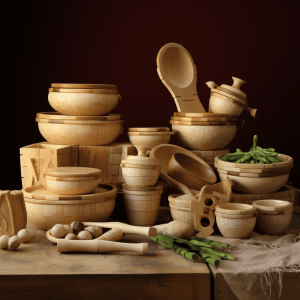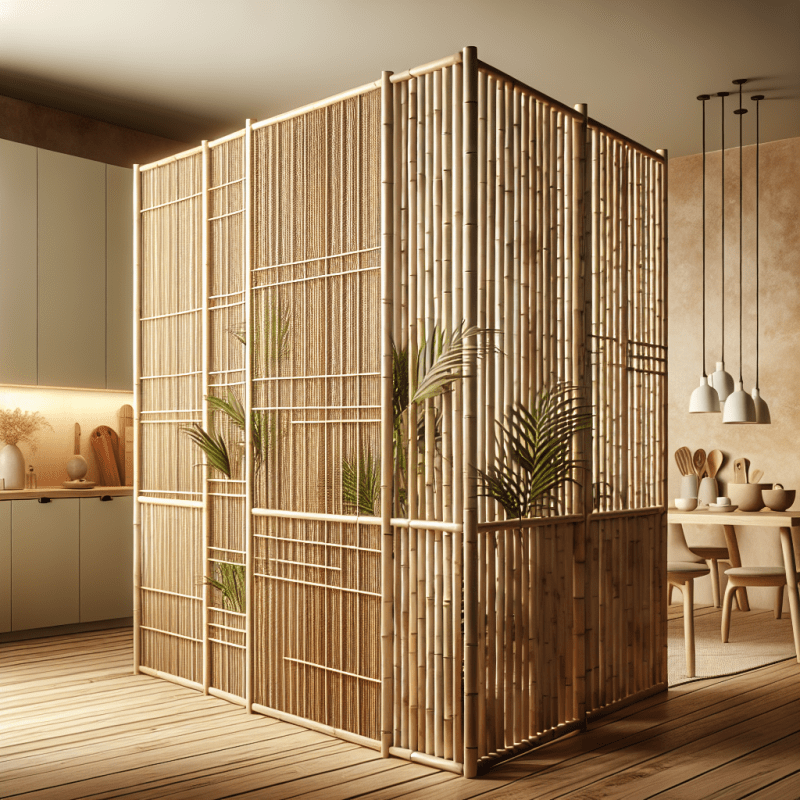In our quest to create waste-free kitchens, one powerful ally stands out: bamboo. Not only is bamboo an eco-friendly material for various household items, but it also has unique characteristics that make it particularly effective in reducing kitchen waste. From cutting boards to utensils and even food wraps, bamboo products offer a sustainable alternative to common single-use items.
One reason bamboo is a top choice for waste-free kitchens is its remarkable durability. Cutting boards made from bamboo are known for their strength and resilience, making them long-lasting and less likely to end up in landfills. Additionally, bamboo's natural antimicrobial properties make it an excellent option for food preparation surfaces. Unlike plastic cutting boards, bamboo boards naturally repel bacteria, minimizing the risk of foodborne illnesses and eliminating the need for harsh chemical cleaners.
Another way bamboo reduces kitchen waste is through its versatility as a material. Bamboo utensils, such as spoons, spatulas, and tongs, are not only lightweight and easy to use, but they can also be composted once they reach the end of their life span. Unlike plastic or metal utensils, which can take hundreds of years to decompose, bamboo utensils break down quickly and return to the earth as organic matter, completing the circle of sustainability.
Finally, bamboo food wraps offer an eco-friendly alternative to plastic wrap or aluminum foil. These wraps are washable, reusable, and completely biodegradable. By embracing bamboo food wraps, we can significantly reduce our reliance on single-use plastic and aluminum products that end up in landfills and contribute to the world's growing waste problem. Bamboo food wraps not only preserve food freshness but also help preserve our planet for future generations.
Discovering the Versatility of Bamboo: Sustainable Kitchen Solutions
In today's world, where sustainability and eco-consciousness are becoming increasingly important, finding ways to reduce waste and choose environmentally friendly options in our kitchens is essential. One of the most versatile and sustainable materials that can help transform our kitchens into waste-free havens is bamboo. With its sturdy yet lightweight nature, bamboo offers a plethora of possibilities when it comes to kitchen solutions.
Bamboo cutting boards have gained popularity for their durability and natural anti-microbial properties. Unlike traditional plastic or glass cutting boards, bamboo is resistant to scratches and water damage, making it an excellent long-term investment for any kitchen. Furthermore, bamboo's quick regrowth makes it highly sustainable, as it can be harvested within a few years compared to trees that take decades to reach maturity.
Another sustainable kitchen solution that bamboo offers is utensils and kitchenware. Bamboo utensils, such as spoons, spatulas, and serving forks, are not only aesthetically pleasing but also highly functional. Bamboo's natural strength and heat resistance make it a great alternative to plastic or metal utensils. Additionally, bamboo mixing bowls and salad servers provide an elegant touch to any kitchen while being eco-friendly, as they are made from a renewable resource.
Lastly, bamboo is an ideal choice for kitchen storage and organization. Bamboo spice racks, knife blocks, and drawer organizers are stylish and functional, helping keep your kitchen neat and tidy. Bamboo's natural beauty and versatility enable it to seamlessly blend with any kitchen decor, while also being a sustainable alternative to plastic or metal storage options.
From Cutting Boards to Utensils: Bamboo's Waste-Free Revolution
Bamboo, a fast-growing and highly renewable resource, has emerged as a leading solution for creating waste-free kitchens. Its eco-friendly properties have attracted attention in various industries, particularly in the production of cutting boards and utensils. The utilization of bamboo in kitchen products not only offers numerous advantages but also contributes to minimizing environmental impact.
One of the standout features of bamboo is its incredible strength and durability. This natural material is harder than most hardwoods, making it ideal for use in cutting boards that can withstand heavy chopping and cutting without wearing or warping easily. Bamboo cutting boards are not only long-lasting but also less prone to developing deep grooves, which can harbor bacteria and pose health risks. The durability of bamboo products ensures that they have a longer lifespan, reducing the need for frequent replacements and thus helping to reduce waste.
In addition to durability, bamboo is known for being naturally antimicrobial. It possesses antimicrobial properties that inhibit the growth of bacteria, making bamboo cutting boards and utensils more hygienic than their traditional counterparts. This inherent quality of bamboo minimizes the chances of cross-contamination and allows for safer food preparation. By opting for bamboo kitchen products, individuals can reduce the reliance on chemical disinfectants, resulting in a healthier and waste-free kitchen environment.
Furthermore, bamboo is an eco-friendly alternative to traditional wood due to its rapid growth and sustainability. Unlike trees that take decades to mature, bamboo plants can grow to full size within three to five years. This quick growth rate ensures a continuous supply of bamboo without the need for deforestation or overexploitation of natural resources. Bamboo's ability to regenerate from its roots also prevents soil erosion, making it an environmentally conscious choice for creating waste-free kitchens.
Building a Sustainable Kitchen: Bamboo's Powerful Green Potential
In today's world where sustainability is becoming a major concern, finding eco-friendly alternatives for everyday materials is crucial. When it comes to building a waste-free kitchen, one of the most powerful and versatile resources to consider is bamboo. This fast-growing plant offers numerous benefits and can play a significant role in reducing our carbon footprint.
Bamboo is a natural choice for sustainable kitchen construction due to its remarkable growth rate. It is one of the fastest-growing plants on the planet, capable of reaching maturity in just a few years. This rapid growth allows for quick replenishment and makes bamboo a highly renewable resource. Unlike hardwood trees that can take decades to fully mature, bamboo can be harvested every 3 to 5 years without damaging the plant itself.
Furthermore, bamboo is known for its strength and durability. It has a higher tensile strength compared to many traditional materials, which means it can withstand heavy use and last for a long time. This makes it an ideal choice for kitchen utensils, cutting boards, and even flooring. By utilizing bamboo products in your kitchen, you can reduce the need for frequent replacements, ultimately leading to less waste generation.
Additionally, bamboo has inherent antibacterial properties, making it an excellent hygienic choice for kitchenware. The natural resins in bamboo extract are effective in inhibiting the growth of bacteria, making surfaces made from bamboo more resistant to microbial contamination. By opting for bamboo cutting boards and utensils, you can ensure a safer food preparation environment while minimizing the use of potentially harmful chemicals found in plastic or other synthetic materials.
4.38 out of 5 starsBamboo Cookware
Sustainable and Stylish Cookware to Elevate Your Kitchen Experience
Product information
Product Review Score
Product links


